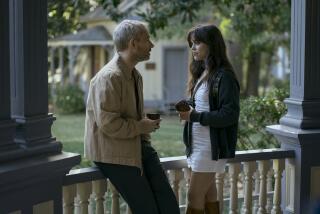Movie Reviews : Plot, Protagonists Periled in ‘Wonderland’
- Share via
Life is fraught with peril for the two 16-year-old English heroes of “Wonderland” (at the Fine Arts), and not just because they’re the only witnesses to a grisly murder at a gay disco. They themselves are homosexual, which leaves them prey to cruel peers, macho fathers and aging seducers, not to mention, of course, that machete-wielding, mascara-wearing homicidal hit man who’s trying to track them down.
Director Philip Saville’s slickly made film is part social drama, part suspense thriller, part Silly Putty. Inasmuch as it attempts to be a thriller trailing teens on the run from a mad killer, “Wonderland” is not all that far removed from the old kid-witness-in-peril theme of “The Window” or “Cloak and Dagger,” updated to include menacing drag queens as well as misunderstanding parents and law figures. But it strives for a more resonant fate for its outcast protagonists.
Young, innocent, persecuted and gay, these two kids are so hemmed in by society and circumstance that they sort of remind you, in a symbolic sort of way, of course, of . . . caged dolphins.
Dolphins? Say what? Everyone’s favorite New Age sea mammals as emblems of wounded gay pride? Indeed, this is the movie’s pivotal and unwieldy symbolic connection, and where the script by Frank Clarke (“Letter to Brezhnev”) finally turns unforgivably loopy. The purpose of these porpoises--part of the show at a Marineland-like seaside emporium called Wonderland--is to represent the limited recourses of our heroes. This the script reminds us of this by having one of the young protagonists keep talking to the brainy fish, saying things like “I’m like you, you know--trapped.”
Yes, we know, and for a while, we care, thanks to some fine acting and intriguing setups. As Eddie, the more naive and effeminately mannered of the two leads, Emile Charles manages to essay a genuine innocent set adrift; his fascination with the campier side of show biz and gay culture seems born out of delight, not decadence. The more street-wise of the pair is Tony Forsyth, equally effective as Michael, a blustery but golden-hearted tough who will sleep with whomever he has to to survive.
Their temporary savior is Robert Stephens, playing an aging opera star whose fondness for young men brings him to take the boys in at his beachside residence; his transition from good guy to victimizer to victim is quite touching. Not so sympathetic is his sort-of paramour, Clare Higgins, nearly as nasty a seductress here as in the “Hellraiser” pictures.
If only we had just these characters to contend with--but the splish-splash of plot elements gets more turbulent. There’s that icy blond killer out there, sharpening his blades as he goes, moving in a preternatural slow motion that is the sole province of filmic maniacs and that would get him a loitering citation in real life. And there are the dolphins. And then the killer meets up with the dolphins, and we’re off into lulu land, never to return.
Not until the jaw-dropping ending is it possible to suspect just how profoundly ludicrous the otherwise promising “Wonderland” (MPAA-rated R) is going to turn out. It wouldn’t be giving too much away to reveal that one of the heroes leaves his mortally wounded pal bleeding alone, at length, in order to participate in a dolphin liberation--which may please the most extreme of animal-rights activists, but which leaves the rest of the audience wondering what happened to the old ideal of fetching paramedics for one’s buddy.
“Save the humans!” could be our rallying cry; better yet, rescue reason.
More to Read
Only good movies
Get the Indie Focus newsletter, Mark Olsen's weekly guide to the world of cinema.
You may occasionally receive promotional content from the Los Angeles Times.









